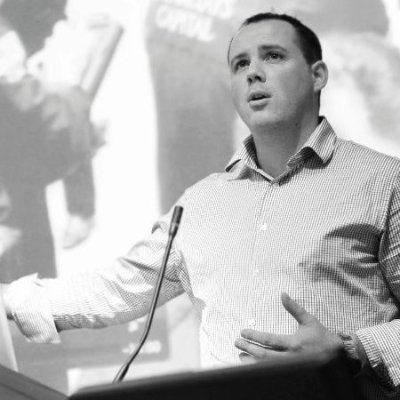A Coach’s Real-World Apprenticeship: Life-Changing Lessons 3 Coaching Masters Taught Me
Coach DevelopmentABOUT THE AUTHOR

Fergus Connolly
Dr. Fergus Connolly is the Director of Performance and Director of Operations at University of Michigan Football and the author of Game Changer. He has worked with teams in the NFL, NBA, Premier League soccer, the Welsh national rugby team and British and American Special Forces.
// Lesson #1: Treat Every Game as an Away Game
I was sitting across the desk from a Special Forces officer as the summer sun lit up his unassuming office. For the next hour, we shared lessons and philosophy on the selection and preparation of elite performers. This commander was responsible for the selection process of an elite Special Operations group.
“You can’t compare what our players do to what your operators do,” I said. “It’s not the same at all. There are two special distinctions. First, we know when our games are and can plan training for them so we can be prepared. You can’t schedule contact with the enemy. Second, if one of our guys makes a mistake, we ‘get Monday.’ We get to practice again and fix it. In your world, you don’t.”
“There’s one other difference, Fergus,” the commander replied calmly. “We only play away games.”
The single biggest threat to successful teams is complacency. This can creep up in many forms. Sometimes it’s media-induced “rat poison,” as Nick Saban referred to it. It can also come from lack of focus or external distractions.
I’ve never forgotten the phrase, “We only play away games.” It is a reminder that until the final whistle blows, you can never allow complacency to set in, because complacency kills. It has been proven true again and again. On one occasion, I stayed at a hotel the night before a game and found schedules and training notes for another team who had stayed there the week before. We’ve all heard stories of game plans going suspiciously “missing” in hotels, too. It got me thinking about how easily complacency can take root and the sloppiness that results. Imagine if we’d been playing that team later in the season. We’d have had their entire game plan because someone wasn’t paying attention to the details. Competition is difficult enough, without giving your opponent an undue edge.
Another officer who was responsible for selection at a similar elite Special Forces group told me how he was once called by the head of the overall unit. Out of 207 recruits who began one year, only seven were selected, a lower acceptance rate than the previous year, when 15 out of 240 trainees had made it through. The commander was asked to explain why so few had been accepted this time around. The officer responsible calmly explained that the men simply hadn’t reached the required standard. He recognized that having fewer men would stretch the unit’s capability. After hearing this explanation, the commander thanked the officer for not letting standards drop.
Complacency kills.
Treat everything like an away game.
// Lesson #2: Always Maximize Your Strengths
Each evening at the NFL Combine, coaches gather to catch up and share stories. I still recall having dinner in Indianapolis with various coaches from both teams and private training facilities, such as Marty Lauzon, Andy Barr, Josh Hingst, AJ Neibel, and Ian Danney. One of the most interesting people and most influential in both the NBA and NFL was Al Vermeil. One evening I sat with a number of coaches, including Rob Panariello, Derek Hansen, and Al. The great thing about this group was its relentless positivity.

Anquan Boldin was a rock-hard competitor. He was both determined and mentally tough. Although he wasn’t the fastest wide receiver, posting a modest 4.71 second 40-yard dash at the combine, Anquan more than compensated for this with an aggressive style of play and his incredibly smart game sense. He epitomized the word “professional” and set a standard at the San Francisco 49ers that many of his teammates aspired to reach.
Winning in sports, business, and the military requires maximizing strengths while reducing the effect of “limiting factors.” I refuse to use the word “weaknesses” in this context. Elite players or world class competitors don’t have weaknesses, but rather things that limit their performance. These prevent the full exploitation of other skills. For example, fast players who have underdeveloped game sense or less experience need to rely more on their speed and power to compensate. Mitigating these limiting factors makes the player more efficient and a better performer overall. To borrow a quote from Bill Knowles, “World class players are often world class compensators.”
In the search for improvement, we always need to maintain our advantages and strengths. These usually determine whether we win games or not, while our limiting factors determine how much we win by. The importance of continuing to develop and maintain strengths extends to teams and organizations as much as individuals. Squads who are physical or who have great culture and spirit – such as Bolton Wanderers under Sam Allardyce – need to continue playing this way, but must also reduce the impact of their limiting factors, such as lesser talent. They can compensate by using tactical formations or strategies.

Sometimes our strengths are not directly sports-related, but are personality driven. Many of the best players are those who have the greatest attention to detail. One example is tennis legend Ivan Lendl. He explained to me how he would prepare for major championships like Wimbledon and the US Open by replicating the playing surface at his home court. He’d use the company (and same exact work crew) that installed the court at the tournament venue to make sure it played the same way. The result? Eight Grand Slam titles.
Your strengths are what help you win. Your limitations determine by how much. But unless your strengths are constantly practiced at the highest intensity possible, they will deteriorate.
// Lesson #3: Never Resist an Opportunity to Shut Up
The Welsh rugby players collapsed on the grass. Craig White, the head of performance, had just blown the whistle after a brutal training session. Drenched in sweat, some of the guys were shirtless and most socks were down around their ankles. I stood beside “Whitey” near the sideline. Bodies were strewn everywhere, having dropped where they stood when the whistle blew to signal the end of practice. I stepped forward with water and began to help the guys up off the ground. Whitey grabbed the back of my shirt. I looked at him and he nodded his head to follow him. We walked off the side of the field in silence.

When we were out of the players’ earshot he said, “Let them be. Sometimes you have to let them pick up the pieces.” It wasn’t being cruel or uncaring. Whitey was smart. He knew that on certain occasions, you don’t need to say anything to the players because they’ll absorb the lesson themselves just by going through an experience.Brendan Rodgers (currently manager of Celtic FC) was a master communicator, as well. I can honestly say that I never heard him criticize a player. He was always encouraging the squad. Everything was positive, supportive, and instructional. He never raised his voice, or criticized a coach in front of a player. He didn’t give long team talks. Acutely aware of his players’ attention and their optimism, Brendan was a diligent student of the game and allowed players to learn for themselves when interrupting would have been easier at times.
He’s not the only soccer genius who was a master of player management. Toon Gerbrands was the football director at AZ Alkmaar, a soccer team who plays in the Dutch league and the only squad outside the top three teams in Holland to win the national title in the past 20 years. Toon told me two very important things I’ve always practiced to this day, both of which he learned from Louis van Gaal. Louis would never correct a player on tactical issues in private. He always did it in front of the whole team for two reasons. Firstly, by speaking to the player in front of their teammates, he communicated something once that he’d otherwise have to tell all 22 squad members individually. Saying it just once ensured clarity of message. Secondly, it meant that no player could leave his office after a private meeting and claim Louis had said something that he didn’t. Anything personal, however, Louis addressed in private.
Warren Gatland also said very little in practice. In training camps, he’d get the players to increase their effort level just by walking through the gym. He rarely raised his voice, smiled at the guys, and broke tension with humor. Early in the week he observed and encouraged, but only loudly enough so nearby players could hear him. However, on game day he spoke with authority and gave crystal clear instructions to the team. To a man, the squad listened intently.
Warren once gave a certain player a great piece of advice: “Never refuse the offer to speak if you’re asked your opinion.” He meant that when you’re asked to voice your views by a coach you have everyone’s attention and should make the most of the opportunity. This doesn’t happen often, but many players either refuse or are caught off guard when asked. Always be prepared and pay attention.
Coaches who talk too much and unnecessarily can make players numb to their voice. They often lose impact on game day, when it’s needed most. These are the same coaches who tend to micromanage and fail to transfer ownership to their assistants and players. Words are powerful, but silence can be equally potent when used properly.
Don’t overuse your voice unless it’s absolutely necessary. Never talk just to talk. Speak to encourage. If something needs to be said as constructive criticism, say it in private. Carefully decide between things that should be said in public and conversations that need to take place behind closed doors.
This post is an exclusive excerpt from Fergus’s new book. To read more, order your copy of 59 Lessons: Working with the World’s Greatest Coaches, Athletes, & Special Forces.
Are you a better coach after reading this?
More coaches and athletes than ever are reading the TrainHeroic blog, and it’s our mission to support them with usefull training & coaching content. If you found this article useful, please take a moment to share it on social media, engage with the author, and link to this article on your own blog or any forums you post on.
Be Your Best,
TrainHeroic Content Team
HEROIC SOCIAL
HEROIC SOCIAL
TRAINING LAB
Access the latest articles, reviews, and case studies from the top strength and conditioning minds in the TH Training Lab

